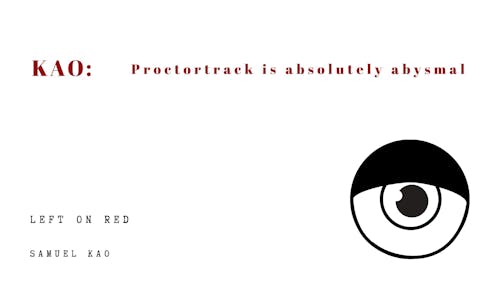KAO: Proctortrack is completely abysmal

There is something obscene about using the coronavirus disease (COVID-19) pandemic to make people's lives worse. Proctortrack does exactly that. At a time when Rutgers students are suffering, subjecting them to surveillance is reprehensible.
Proctortrack is not new to Rutgers, unfortunately. The University first rolled out the software in 2015 under murky circumstances. For the first seven months of Proctortrack's use, there was no contract in place between Rutgers and Verificient Technologies, the company behind the software. At the time, students pushed back against Proctortrack, and the backlash even received coverage in The New York Times.
The Proctortrack software is invasive, recording a student's biometric data as well as every action the student makes through a webcam. Even worse, Verificient Technologies stores these recordings for up to 180 days on its servers. Unsurprisingly, there has been a lack of transparency from Verificient Technologies about how it disposes of student data. The abysmal record of technology companies on the issue of privacy belies whatever claims Verificient Technologies might make about its data protections.
It should be obvious why Proctortrack is flawed. It induces paranoia among students, which is hardly conducive to learning, and it strips away the right to privacy that all students are entitled to. The software does not even work as intended. Proctortrack will flag the most innocuous movements: looking away from the camera for a few seconds, reaching down to pick up a fallen pencil, as "suspicious."
This is not just a technical issue. The solution is not, as those with a technocratic bent might suggest, to build proctoring software that works, that generates fewer false positives. We have to ask: Why are students deemed guilty until proven otherwise?
There is a pernicious logic at work with the use of Proctortrack. Because all classes have moved online, this thinking goes, students must be slacking. With no evidence to suggest otherwise, student culpability is assumed. "Of course," one might think: Students will cheat in online classes. They have every incentive to!
This carceral discourse gets it wrong. Most students do take academic integrity seriously. Right now, students have enough on their minds, and this adversarial mindset helps no one. It is the job of instructors to accommodate their students in this trying time, not to impose surveillance. Many instructors have taken positive steps toward helping students, but those who insist on deploying Proctortrack only cause further harm.
In fact, assessment guidelines released by Rutgers discourage the use of Proctortrack during this time. These guidelines rightly highlight the problems with the software and suggest the implementation of alternate assessments that do not require active, timed proctoring. But this is merely a suggestion. Instructors are still free to shove Proctortrack into the faces of their students.
This is not to place the onus wholly on instructors. Like students, they have also had to transition their courses online with very little notice, which is no small task. Most instructors want to perform their jobs as teachers well, a task I sympathize with. The usage of Proctortrack largely stems from an impulse to maintain academic rigor. But, this impulse is misguided. Under the circumstances of a pandemic, it is ridiculous to pretend that "rigor" is possible, or even desirable. As the saying goes, everyone in the academy is smart - be kind instead.
In the corporate university, students are customers who are always wrong. Forced to pay ever-increasing tuition fees, students must take on crushing debt. When they complain, overpaid administrators dismiss them as "whiny." With the onset of the pandemic, students have been forced into even greater precarity. Kindness is imperative.
Due to the pandemic, so many things once thought impossible are now possible. Government officials said, "No one should be evicted," "No one should have their internet or phones cut off" - during a pandemic. Why is something unacceptable in a pandemic acceptable at any other time? The pandemic highlights the absurdity of these arbitrary rules.
If Rutgers can acknowledge the problems with Proctortrack, as its own remote assessment guidelines state, why should Proctortrack ever be allowed? Kindness should not be contingent upon a pandemic. Proctortrack is unacceptable, regardless of the coronavirus.
The fact that the University will not even formally rule out the usage of Proctortrack in a pandemic does not bode well for the future. Should the entire fall semester go online, expect more corporate surveillance to come. Our task must be to organize against it.
Samuel Kao is a School of Arts and Sciences sophomore majoring in history. His column, "Left on Red," runs on alternate Wednesdays.
*Columns,cartoons and letters do not necessarily reflect the views of the Targum Publishing Company or its staff.
YOUR VOICE|The Daily Targum welcomes submissions from all readers. Due to space limitations in our print newspaper, letters to the editor must not exceed 900 words. Guest columns and commentaries must be between 700 and 900 words. All authors must include their name, phone number, class year and college affiliation or department to be considered for publication. Please submit via email to oped@dailytargum.com by 4 p.m. to be considered for the following day's publication. Columns, cartoons and letters do not necessarily reflect the views of the Targum Publishing Company or its staff.



